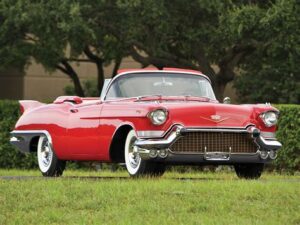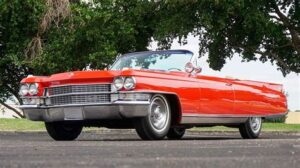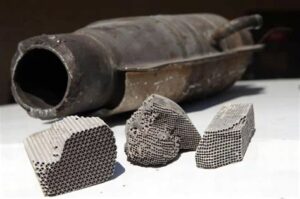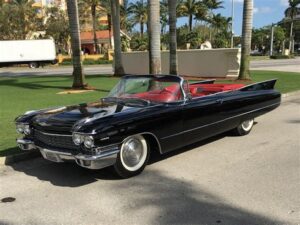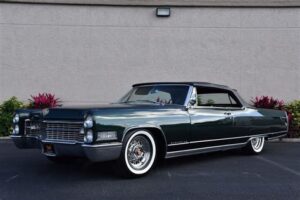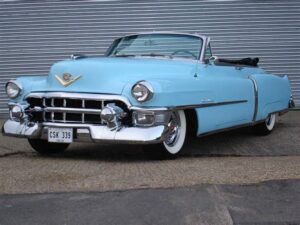When it comes to optimizing your Jeep Cherokee’s performance while maintaining environmental integrity, understanding the role of the Cadillac converter is essential. This vital component not only enhances your vehicle’s efficiency but also plays a crucial role in reducing harmful emissions. However, Jeep Cherokee owners often face challenges related to Cadillac converters, impacting both performance and compliance with emission standards. In this article, we will explore the functions and benefits of the Cadillac converter in Jeep Cherokee models, identify common issues you may encounter, and offer tips for upgrading and maintaining this important part. Whether you’re looking to enhance your vehicle’s performance or extend the lifespan of your Cadillac converter, we’ve got you covered! Dive in to discover how to keep your Jeep Cherokee running smoothly and efficiently.
Understanding The Cadillac Converter In Jeep Cherokee Models
The cadillac converter, more commonly known as the catalytic converter, plays a critical role in the functionality of Jeep Cherokee models. This component is integral to the vehicle’s exhaust system, responsible for converting harmful gases produced during combustion into less harmful emissions before they are released into the atmosphere. Understanding how the catalytic converter operates can help drivers appreciate its importance and recognize common issues that may arise.
In Jeep Cherokee models, the cadillac converter functions by utilizing a chemical process. It typically consists of precious metals such as platinum, palladium, and rhodium, which are used to facilitate the conversion process. Here are the primary types of conversions that take place:
| Process | Purpose |
|---|---|
| Oxidation of Carbon Monoxide | Convert harmful CO into carbon dioxide (CO2) |
| Oxidation of Unburned Hydrocarbons | Convert unburned fuel into carbon dioxide and water |
| Reduction of Nitrogen Oxides | Convert NOx into nitrogen (N2) and oxygen (O2) |
It’s crucial for Jeep Cherokee owners to be aware of the potential signs of a malfunctioning cadillac converter. Decreased fuel efficiency, unusual sounds such as rattling, or a check engine light can indicate issues. Routine maintenance and timely inspections can help ensure that the catalytic converter operates efficiently, contributing to both performance and environmental compliance.
The cadillac converter in Jeep Cherokee models is not just a component but a vital part of reducing emissions and optimizing performance. By understanding its function and maintenance needs, owners can enhance their vehicle’s longevity and compliance with environmental standards.
Common Issues With Cadillac Converters In Jeep Cherokees
The cadillac converter plays a crucial role in the exhaust system of Jeep Cherokees, but like any component, it can experience problems over time. Here are some of the most common issues that can arise with the cadillac converter in these vehicles:
| Issue | Description | Symptoms |
|---|---|---|
| Clogged Converters | Accumulation of carbon deposits can restrict exhaust flow. | Poor engine performance, loss of power. |
| Failed O2 Sensors | Oxygen sensors monitor the exhaust and can fail, affecting the cadillac converter. | Check engine light, increased fuel consumption. |
| Overheating | Excessive heat can damage the cadillac converter, often caused by a rich fuel mixture. | Burning smell, visible damage to the undercarriage. |
| Physical Damage | Road debris or accidents can cause physical damage to the cadillac converter. | Rattling noises, exhaust leaks. |
Addressing these issues promptly can help maintain both the performance and emissions standards of your Jeep Cherokee. Regular inspections and timely maintenance are essential in preventing further damage to the cadillac converter and ensuring optimal vehicle operation.
Upgrading Your Jeep Cherokee’s Cadillac Converter For Performance
When it comes to enhancing the performance of your Jeep Cherokee, upgrading the cadillac converter is an excellent place to start. A high-performance cadillac converter can improve exhaust flow, increase horsepower, and enhance overall engine performance. Below are the key factors to consider when upgrading:
| Type of Cadillac Converter | Benefits | Considerations |
|---|---|---|
| High-Flow Cadillac Converter | Improved exhaust flow and power | May be louder; check local regulations |
| Performance Cadillac Converter | Enhanced catalytic efficiency | Higher cost; ensure proper installation |
| OEM Replacement | Maintains factory specifications | Less power gain; focuses on emissions |
Before purchasing a new cadillac converter, it’s essential to evaluate your specific performance goals. Whether you want to boost horsepower for off-road adventures or simply improve gas mileage, there are options tailored to your needs.
Additionally, when upgrading, ensure compatibility with your Jeep Cherokee’s make and model to avoid complications during installation. Consulting with a professional mechanic familiar with Jeep modifications can provide invaluable insight and recommendations.
Always keep in mind the regulations surrounding exhaust modifications in your locality, as some aftermarket converters may not comply with emissions standards.
How A Cadillac Converter Affects Jeep Cherokee Emissions
The cadillac converter plays a crucial role in controlling the emissions produced by your Jeep Cherokee. This device is responsible for converting harmful gases generated during combustion into less harmful substances before they are expelled from the exhaust system. When functioning optimally, the cadillac converter significantly reduces harmful pollutants such as carbon monoxide, nitrogen oxides, and unburned hydrocarbons.
In Jeep Cherokees, the efficiency of the cadillac converter directly impacts the vehicle’s overall emissions profile. A well-maintained cadillac converter will help ensure that your Jeep meets environmental regulations and standards, contributing to more sustainable driving practices. When the converter begins to degrade or become clogged, it can lead to increased emissions, which not only could result in failing emissions tests but also has a negative impact on air quality.
Additionally, the performance of the cadillac converter can affect fuel efficiency. If the converter is not functioning correctly, your Jeep may rely on more throttle to achieve desired speeds, leading to higher fuel consumption and, consequently, higher emissions. Therefore, regular maintenance and timely upgrades of the cadillac converter are essential for maintaining the emissions integrity of your Jeep Cherokee.
Maintenance Tips For Prolonging Your Cadillac Converter’s Life
Taking care of your cadillac converter is essential for maintaining your Jeep Cherokee’s performance and ensuring compliance with emissions regulations. Here are some effective maintenance tips to help you prolong the life of your cadillac converter.
- Regular Engine Checks: Keep your engine in good working condition. Regularly check for any leaks, misfires, or engine issues that could affect your cadillac converter.
- Use Quality Fuel: Always use high-quality fuel from reputable sources. Low-quality fuel can contain harmful substances that may clog your cadillac converter.
- Avoid Excessive Idling: Limit idling time to reduce the chances of damage. Prolonged idling can lead to inefficient combustion, which can harm the cadillac converter.
- Monitor Engine Temperature: Ensure your engine runs at the optimal temperature. Overheating can damage the cadillac converter, so pay attention to your temperature gauges.
- Check for Error Codes: Use an OBD-II scanner to check for any diagnostic trouble codes. Early detection of issues can help prevent damage to the cadillac converter.
- Maintain Exhaust System: Regularly inspect your exhaust system for leaks or damages. A compromised exhaust can lead to excessive heat or unburned fuel reaching the cadillac converter.
- Follow Recommended Service Intervals: Keep up with your Jeep Cherokee’s maintenance schedule, including regular oil changes and tune-ups, to ensure everything is functioning properly.
By following these maintenance tips, you can significantly extend the lifespan of your cadillac converter and maintain the overall performance of your Jeep Cherokee.
Frequently Asked Questions
What is a catalytic converter and what role does it play in a Jeep Cherokee?
A catalytic converter is an essential component of the exhaust system in a Jeep Cherokee that helps reduce harmful emissions by converting toxic gases into less harmful substances before they are released into the atmosphere.
How can I tell if my Jeep Cherokee’s catalytic converter is failing?
Signs of a failing catalytic converter include decreased engine performance, a noticeable decrease in fuel efficiency, rattling noises from the exhaust system, and illuminated check engine lights. If you experience these symptoms, it’s advisable to have it inspected.
What are the common causes of catalytic converter failure in Jeep Cherokees?
Common causes of catalytic converter failure in Jeep Cherokees include engine misfires, oil or coolant leaks, running too rich or too lean, and the use of inferior fuel. Regular maintenance can help prevent these issues.
How much does it typically cost to replace a catalytic converter in a Jeep Cherokee?
The cost to replace a catalytic converter in a Jeep Cherokee can vary widely depending on the model year and make. On average, you might expect to pay anywhere between $1,000 and $3,000, including parts and labor.
Can I drive my Jeep Cherokee with a bad catalytic converter?
While it is technically possible to drive with a bad catalytic converter, it is not recommended. Doing so can lead to further engine damage, more expensive repairs, and increased emissions, which is harmful to the environment.
Are aftermarket catalytic converters reliable for Jeep Cherokees?
Aftermarket catalytic converters can be a cost-effective alternative, but reliability can vary. It’s crucial to do thorough research, select reputable brands, and ensure that the converter meets regulatory standards for emissions control.
What are some preventative measures I can take to prolong the life of my Jeep Cherokee’s catalytic converter?
To prolong the life of your Jeep Cherokee’s catalytic converter, ensure regular maintenance, address engine issues promptly, use high-quality fuel, and avoid running the engine in low fuel situations, which can lead to contamination.
